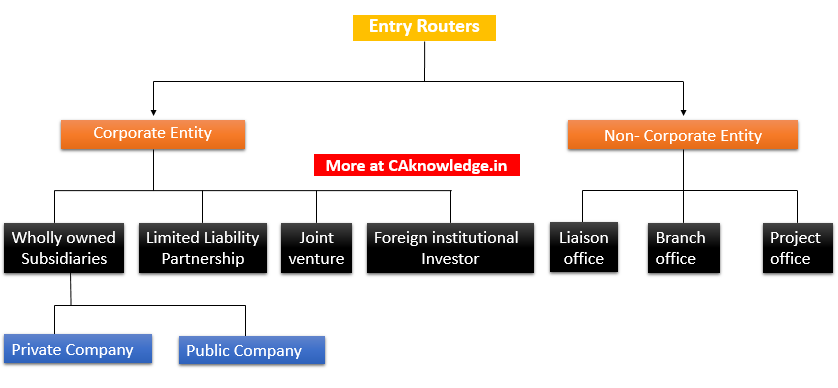Setting Up of Business in India by Foreign Companies, Foreign investments are a very vital part of a country’s economy. Government of India has always shown keen interest in formulating the consolidated Foreign Direct Investment (FDI) Policy and other investment policies, with an intent and objective to promote foreign investment in the country, through a transparent and hassle free regulatory system. Last year, the government liberalised norms for foreign investment in certain sectors like construction-development, railways, defense and medical devices.
The Indian government’s liberalised approach and a robust business environment have strengthened the faith of foreign investors. Global brands lined up to invest in India as the government opened more sectors to foreign investment. This article highlights various ways in which foreign companies may enter India and start business in various forms of entities. The procedure and compliances required for incorporation of such entities by foreign investor is also discussed in detail.
Quick Links
Setting Up of Business in India by Foreign Companies
Below are some quick facts on India’s foreign investment:
- FDI inflows during April-October of the financial year 2014-15 grew by 26 per cent to $17.34 billion from $13.82 billion in the same period a year earlier
- Total FDI inflows into India in the period April 2000–August 2014 touched US$ 341,357 million. Total FDI inflows into India during the period April–August FY15 was US$ 17,445 million
- Mauritius led the share of top investing countries by FDI equity inflows into India with US$ 3,934 million during April-August FY15, followed by Singapore (US$ 1,892 million), the Netherlands (US$ 1,562 million) and Japan (US$ 897 million).
India, being one of the fastest growing economies in the world which has also sustained the downturn of 2008-09, offers huge potential and promising business opportunities for global investment community. Liberalised policies, simplified regulatory norms and adoption of ‘best practices’ in production of goods and services have been the key factors in attracting foreign investment in the country.
Choosing the Form of Business for Investment in India
Foreign investment can come into the country in various forms and entities. Each form has its own set of merits and demerits. The key is to balance the advantages and disadvantages of various forms of business. A prospective foreign investor will have to keep in mind various aspects before entering into the Indian market, including regulatory requirements, sources of financing, setting up of infrastructure, etc.
Key factors on which choosing the form of business depends:
Nature of Business
Nature of business for which the foreign entity is desirous of making investment in India is one of the crucial factors. There are certain sectors where foreign investment is either partially allowed or completely prohibited by the Indian government. A joint venture might be most suitable form if the foreign company is willing to provide technical know-how to an already established Indian entity and in turn Indian company may contribute in terms of infrastructural set up, manpower, etc. Similarly, a liaison office might be set up in India to spread awareness about the foreign company, explore new markets or to promote its business interests.
Scale of Operations
Another key factor in choosing the right form of setting up business in India is the scale of operations with which the foreign company is willing to start its business. If the volume of proposed operations is large then it is preferable to set up a wholly owned subsidiary company (private or public). If the foreign investor intends to invest for short duration or for a specific project in India, then a liaison office can be set up. Foreign companies engaged in the business of manufacturing and trading activities outside India, may set up a branch office to facilitate import/ export of their goods or for providing services to their customers in India. Similarly, a limited liability partnership (LLP) is suitable for small and medium scale business.
Amount of Capital to be Invested
One of the major concerns before setting up a business entity in India by a foreign investor is the amount of capital proposed to be invested. Setting up of and complying with regulatory norms in case of a branch office or a liaison office requires less capital as compared to incorporating a wholly owned private or public subsidiary. Moreover, complying with the statutory requirements in case of a wholly owned subsidiary is also a costly affair.
Entry Routes Available to Foreign Investor
A foreign entity planning to invest in India can do so either by forming a corporate entity or a noncorporate entity
Corporate Entity
- Wholly Owned Subsidiaries
- Private Company
- Public Company
- Limited Liability Partnership
- Joint Venture Company
- Foreign Institutional Investor
Non – Corporate Entity
- Liaison Office/Representation Office
- Branch Office
- Project Office
Relevant Parts of this article

